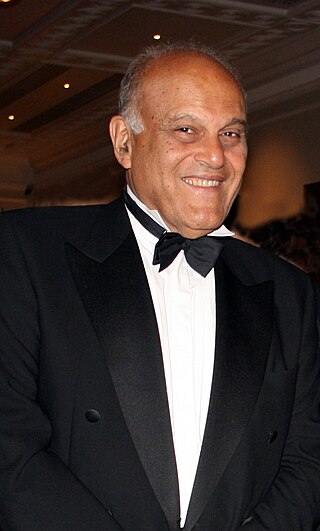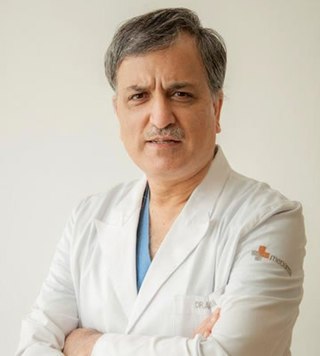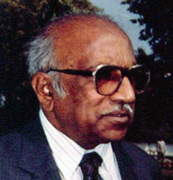
Sir Magdi Habib Yacoub is an Egyptian-British retired professor of cardiothoracic surgery at Imperial College London, best known for his early work in repairing heart valves with surgeon Donald Ross, adapting the Ross procedure, where the diseased aortic valve is replaced with the person's own pulmonary valve, devising the arterial switch operation (ASO) in transposition of the great arteries, and establishing the heart transplantation centre at Harefield Hospital in 1980 with a heart transplant for Derrick Morris, who at the time of his death was Europe's longest-surviving heart transplant recipient. Yacoub subsequently performed the UK's first combined heart and lung transplant in 1983.

All India Institute of Medical Sciences, New Delhi, is a public medical research university and hospital in New Delhi, India. The institute is governed by the AIIMS Act, 1956 and operates autonomously under the Ministry of Health and Family Welfare.

K. M. Cherian, in full Kotturathu Mammen Cherian, is an Indian heart surgeon. He performed India's first coronary artery bypass surgery and first heart Lung transplant. and is considered a pioneer of pediatric cardiac surgery in the country. He is also a former honorary surgeon to the President of India and a Padma Shri awardee.
Sri Jayadeva Institute of Cardiovascular Sciences and Research (SJICR) is a tertiary care autonomous healthcare institute run by the Government of Karnataka, in Bengaluru, with additional centers in Mysuru and Kalaburagi. At the Bengaluru campus, it presently has 1150 in-patient beds for cardiology, cardiothoracic surgery and pediatric cardiology, spread over two twin eight story buildings and is considered one of the largest dedicated heart hospitals in Asia. This new building which was opened in 2001 and was built at a cost of US$17 million.

Naresh Trehan is an Indian cardiovascular and cardiothoracic surgeon. After graduating from King George's Medical University, Lucknow, India, he went on to practice at New York University Medical Center, Manhattan, USA from 1971 to 1988. He returned to India and started Escorts Heart Institute and Research Centre. He serves as the chairman and managing director and chief cardiac surgeon of Medanta-The Medicity. He has served as personal surgeon to the President of India since 1991, has received numerous awards, including the Padma Shri, Padma Bhushan, Lal Bahadur Shastri National Award and Dr. B. C. Roy Award.
Dasari Prasada Rao is an Indian Cardiothoracic surgeon. He was noteworthy for introducing the first open heart surgery to the state of Andhra Pradesh in India and for pioneering advanced medical care at affordable costs. Dasari Prasada Rao has won numerous awards including in 2001 the Padma Shri award, a Civilian award bestowed by the Government of India.

Panangipalli Venugopal was an Indian cardiovascular surgeon and hospital administrator from Rajahmundry, Andhra Pradesh, India who is widely regarded as a pioneer in cardiac surgery. The Government of India honored him, in 1998, with the Padma Bhushan, the third highest civilian award, for his services to the field of Medicine.
Ganesh Kumar Mani is an Indian cardiothoracic and vascular surgeon, reported to have performed over 20,500 Coronary artery bypass surgeries. He was honoured by the Government of India, in 2013, by bestowing on him the Padma Shri, the fourth highest civilian award, for his contributions to the fields of medicine and medical education.
Balram Bhargava is an Indian physician scientist, cardiologist, medical educationist, and innovator. He is currently serving as the Chief of Cardiothoracic Centre, AIIMS. He is the former Director General at the Indian Council of Medical Research, New Delhi and secretary of the Department of Health Research; a division under Ministry of Health and Family Welfare, Government of India.
Stanley John was an Indian cardiothoracic surgeon, a former professor at the Christian Medical College and Hospital (CMCH) and one of the pioneers of cardiothoracic surgery in India. He is reported to have performed the first surgical repairs of Ebstein's anomaly, Ruptured Sinus of Valsalva (RSOV) and Double Outlet Right Ventricle (DORV) in India. He assisted in performing the first open heart surgery in India while working at CMCH. During his tenure of 25 years at the institution, he mentored several known surgeons such as V.V. Bashi, A. G. K. Gokhale, J. S. N. Murthy and Ganesh Kumar Mani. Later, John joined Yellamma Dasappa Hospital, Bengaluru at the Department of Thoracic and Cardiovascular Surgery. He is an elected fellow of the National Academy of Medical Sciences, and the Government of India awarded him the fourth highest Indian civilian award of Padma Shri in 1975. He served as the 13th President of the Indian Association of Cardiovascular-Thoracic Surgeons (IACTS) between 1982 and 1983. John died on 23 February 2020, at the age of 87.
Jagdev Singh Guleria is an Indian general physician, cardiologist and a former Dean and Professor of the All India Institute of Medical Sciences, New Delhi. He is the senior consultant of General Medicine at Sitaram Bhartia Institute of Science and Research and an Emeritus Professor of the National Academy of Medical Sciences. He received the fourth highest Indian civilian honour of the Padma Shri in 2003.
Subhash Chand Manchanda is an Indian cardiologist and a senior consultant of Sir Ganga Ram Hospital, New Delhi. He is a Senior Consultant and Co-ordinator of the Diplomate of National Board program of the National Board of Examinations and a former professor and Head of the Department of Cardiology at the All India Institute of Medical Sciences, New Delhi (AIIMS). He is the chairman of the advisory board of Diya Foundation, a non governmental organization managing a number of charitable institutions for the under-privileged children and aged people.

Kewal Kishan Talwar is an Indian cardiologist, medical academic and writer, and a former chairman of the Medical Council of India. He is a former director of the Post Graduate Institute of Medical Education and Research (PGIMER) and is reported to have performed the first implantation of Implantable cardioverter-defibrillator (ICD) therapy in South Asia. He is also credited with the introduction of Cardiac Resynchronization Therapy in India. He is a recipient of several honours including B. C. Roy Award, the highest Indian award in the medical category. The Government of India awarded him the third highest civilian honour of the Padma Bhushan, in 2006, for his contributions to medicine. Presently Dr. Talwar is working in PSRI Hospital Sheikh Sarai, New Delhi as the chairman of Cardiac Sciences
Tapan Kumar Lahiri is an Indian cardiothoracic surgeon, medical academic and writer from the state of Uttar Pradesh, India. He is a former professor at the Department of Cardiothoracic Surgery of the Institute of Medical Sciences, Banaras Hindu University. The Government of India awarded him the fourth highest civilian honour of the Padma Shri, in 2016, for his contributions to medicine.

Kamal Kumar Sethi is an Indian neurologist

Prafulla Kumar Sen MD was an Indian vascular and cardiothoracic surgeon, who led the world's sixth attempt of human heart transplant and India's first in 1968. It dubbed him the fourth surgeon in the world to carry out this operation.
Gurukumar Bhalachandra Parulkar was an Indian cardiothoracic surgeon and a professor emeritus at King Edward Memorial Hospital and Seth Gordhandas Sunderdas Medical College. He also served as the president of the Association of Surgeons of India in 1984.

K R Balakrishnan is an Indian cardiothoracic and heart transplant surgeon. He is the member of Indian Medical Association.
Uwe Klima is UAE based professor of surgery and a faculty member at the Hannover Medical School, Germany. He also is the medical and managing director at German Heart Centre, Dubai.

Dr. Anil Bhan is the Chairman of Cardiac Surgery Heart Institute, Medanta Hospital, Gurugram, India. He graduated from Medical College Srinagar. He has the largest experience in aortic surgery in India since he has designed and developed more than 50 surgical instruments in the field of cardiac surgery. He was one of the team members to perform the first successful heart transplant in India in1994. He served as a co-founder of Max Heart and Vascular Institute, Saket, New Delhi, Director and Chief Co-Ordinator, Cardio thoracic and Vascular Surgery, MHVI, Saket.Additional Professor, Cardiothoracic Surgery and Vascular Surgery, AIIMS, New Delhi.












